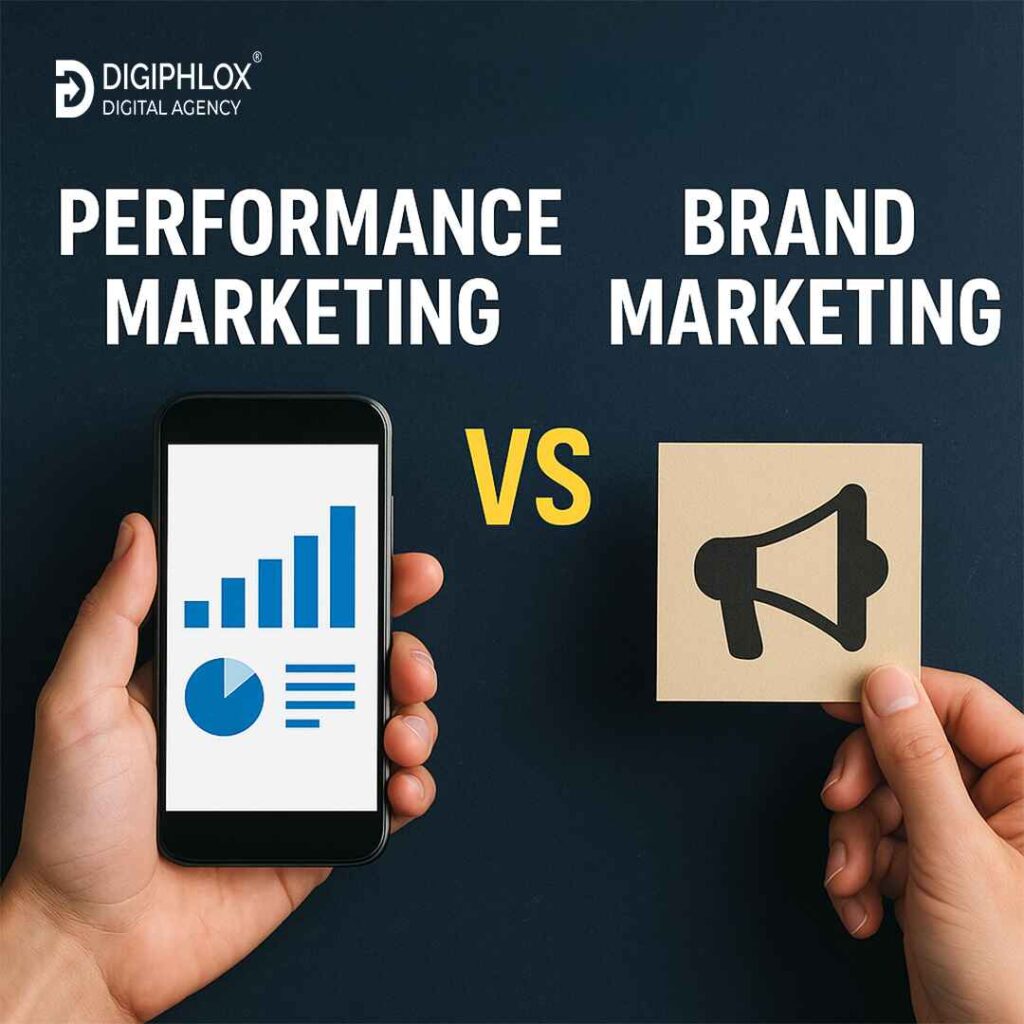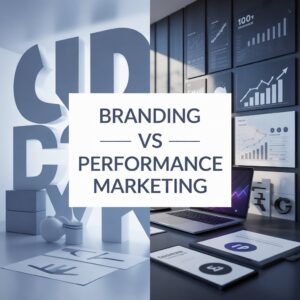In today’s competitive digital world, every business wants two things — visibility and results. But when it comes to achieving these goals, marketers often face a common question: Should I focus on Performance Marketing or Brand Marketing?
Both approaches play a crucial role in a company’s growth. However, understanding their key differences and how they complement each other is the secret to building a strong, sustainable marketing strategy.In this blog, we’ll break down the Performance Marketing vs Brand Marketing debate — what they are, how they work, their pros and cons, and which one fits your business better.

What Is Performance Marketing?
Performance Marketing is a data-driven strategy where you pay only when specific results are achieved — such as a click, lead, sale, or sign-up. It’s all about measurable, short-term results.
This marketing method focuses on immediate performance and return on investment (ROI). Businesses can see exactly what works and what doesn’t, making it ideal for campaigns that aim to drive quick growth.
Popular Channels Used in Performance Marketing:
- Google Ads (PPC)
- Social Media Advertising (Facebook, Instagram, LinkedIn)
- Affiliate Marketing
- Retargeting Campaigns
- Influencer Marketing (Pay-per-performance deals)
Example:
If a fitness brand runs Facebook ads promoting its gym membership, and only pays when someone signs up, that’s Performance Marketing. The focus is on tangible outcomes like conversions or leads.
What Is Brand Marketing?
Brand Marketing is about building a lasting emotional connection between your business and your audience. It focuses on how people feel about your brand, rather than just getting them to take immediate action.
The goal is to create awareness, trust, and loyalty — positioning your business as a reliable, recognizable name over time.
Key Brand Marketing Activities:
- Content Marketing (Blogs, Videos, Podcasts)
- PR and Storytelling
- Social Media Branding
- Sponsorships and Events
- Consistent Visual and Verbal Identity
Example:
Think of Nike, Apple, or Coca-Cola. Their ads don’t just promote products; they sell an idea, a lifestyle, and a feeling. That’s Brand Marketing in action — it focuses on emotions and long-term relationships.
Performance Marketing vs Brand Marketing: Key Differences
| Aspect | Performance Marketing | Brand Marketing |
| Goal | Drive immediate sales, leads, or conversions | Build trust, loyalty, and long-term recognition |
| Time Frame | Short-term (weeks or months) | Long-term (months or years) |
| Measurement | ROI, clicks, conversions, cost-per-acquisition | Brand awareness, sentiment, audience reach |
| Budget Focus | Measurable results and return | Long-term storytelling and engagement |
| Approach | Data-driven and tactical | Emotional and creative |
| Outcome | Direct revenue impact | Strong market positioning and loyalty |
When we talk about Performance Marketing vs Brand Marketing, it’s not about which one is better — it’s about understanding their strengths and using them strategically.
Advantages of Performance Marketing
- Real-Time Measurable Results:
Every click, lead, or sale can be tracked and analyzed instantly. - Quick ROI:
Businesses see immediate returns, making it perfect for short-term campaigns. - Easy Optimization:
Data-driven insights help marketers improve campaigns on the go. - Scalability:
Once you find a winning formula, it’s easy to scale up and increase results fast.
When to Use Performance Marketing:
If your business needs immediate sales, measurable ROI, and fast growth, performance marketing is your go-to strategy.
Advantages of Brand Marketing
- Builds Long-Term Loyalty:
Brand marketing nurtures relationships, ensuring repeat customers. - Creates Emotional Value:
Customers remember brands that connect emotionally, not just through offers. - Improves Credibility:
A strong brand image helps you stand out in crowded markets. - Supports All Future Campaigns:
Once your brand is recognized, every marketing campaign performs better.
When to Use Brand Marketing:
If you want to establish authority, gain long-term trust, and strengthen your reputation, brand marketing is essential.
Combining Performance Marketing and Brand Marketing
Rather than choosing one, smart businesses combine both. The Performance Marketing vs Brand Marketing approach doesn’t have to be a battle — it can be a partnership.
Here’s how they work together effectively:
- Use Performance Marketing for short-term actions — like generating leads, traffic, and conversions.
- Use Brand Marketing for long-term growth — to establish credibility, authority, and trust.
Example:
A real estate agency can run Google Ads to capture leads (performance marketing) while posting high-quality stories, client testimonials, and brand videos (brand marketing) to build trust.
This balance ensures you’re not just chasing numbers but also nurturing a loyal audience that stays with you.
How to Balance Both Strategies
Finding the right mix of Performance Marketing vs Brand Marketing depends on your goals, budget, and business maturity. Here’s how to get started:
- Start with Brand Foundations:
Define your logo, message, tone, and visual identity. Your brand is your story. - Launch Performance Campaigns:
Once you have a solid identity, start running targeted ads to bring measurable results. - Analyze and Adjust:
Track every metric. Let data guide where to increase or reduce your spending. - Stay Consistent:
Keep your branding consistent across both paid and organic channels.
Over time, brand strength will improve your performance campaigns — and successful campaigns will fund more brand-building efforts.
Conclusion
When comparing Performance Marketing vs Brand Marketing, remember that neither is inherently better — they’re just different tools for different objectives.
Performance marketing gives you fast, measurable success. Brand marketing gives you credibility and staying power. The real magic happens when you combine both — quick wins backed by a strong, trusted name.
Want to experience the perfect balance of performance and brand growth?
Partner with Digiphlox — your trusted digital marketing agency that blends creative branding with data-driven performance to deliver real, lasting results.











